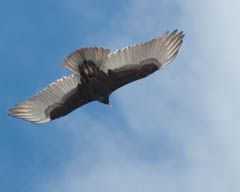February 2008
Issue
In February 2008, Loudoun Wildlife Conservancy was informed by a concerned citizen that the town governments of Hamilton and Middleburg planned to kill Turkey and Black Vultures and hang their dead bodies from trees in order to discourage fellow birds from roosting in surrounding trees and structures.
Because Turkey and Black Vultures are protected under the Federal Migratory Bird Treaty Act, killing even one bird requires a permit from the USDA. Loudoun Wildlife Conservancy, with an outcry from our members and residents in the towns, investigated the issues to gain an understanding of the extent of the flocks and if any damage was being caused by the birds. In each case, the flock size was not extraordinary, and we did not find any damage.
Action
As a result, we sent letters to each of the town governing bodies and to the local newspapers and sent out a call to action to Loudoun Wildlife Conservancy supporters asking citizens to speak out.

Outcome
A lot of you sent emails and mailed letters to Middleburg and Hamilton and you made a difference! Thank you! Neither town killed vultures this year although Middleburg had a permit to kill 200 birds.
The letter that we sent to the town councils and Mayors provided a summary of Loudoun vulture population data over the past ten years, information on the benefits of vultures and their migratory patterns, and information debunking the health risks that were being insinuated. Further, we requested copies of the applications for the permit to kill the birds so that we could review the justifications.
As of April 3, 2008, we have not received the requested information. We have offered to each town our services in providing educational programs and information about the lifecycles and benefits of these birds so that greater public awareness and appreciation can be gained.
We will continue to stay involved in this issue for a number of reasons. It is a very important issue as it not only sets an example for children regarding respect, appreciation and tolerance of wildlife, but also because vultures play an invaluable role in our ecosystem.

